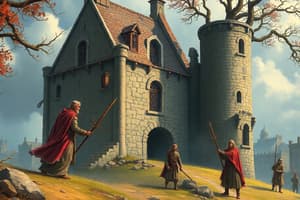Podcast
Questions and Answers
The Angles, Saxons, and Jutes were:
The Angles, Saxons, and Jutes were:
- Viking raiders from Scandinavia
- Roman legions stationed in Britain
- Celtic tribes native to Britain
- Germanic tribes that migrated to Britain (correct)
What became the permanent abode of the Anglo-Saxons?
What became the permanent abode of the Anglo-Saxons?
- Ireland
- Scotland
- Wales
- England (correct)
Which of the following words from modern English has its roots in Old English?
Which of the following words from modern English has its roots in Old English?
- Rendezvous
- Kiss (correct)
- Déjà vu
- Chauffeur
How was Anglo-Saxon poetry typically presented?
How was Anglo-Saxon poetry typically presented?
What is the most famous surviving work of Anglo-Saxon poetry?
What is the most famous surviving work of Anglo-Saxon poetry?
How did the Anglo-Saxons view themselves?
How did the Anglo-Saxons view themselves?
Who is considered the first English writer?
Who is considered the first English writer?
Which Anglo-Saxon poet is famous for his religious poetry and wrote 'Hymn' in honor of God?
Which Anglo-Saxon poet is famous for his religious poetry and wrote 'Hymn' in honor of God?
What marked the end of the Anglo-Saxon period?
What marked the end of the Anglo-Saxon period?
Which Anglo-Saxon prose writer was a priest and known for works like 'Lives of the Saints' and 'Homilies'?
Which Anglo-Saxon prose writer was a priest and known for works like 'Lives of the Saints' and 'Homilies'?
Which key characteristics are associated with Anglo-Saxon poetry according to the text?
Which key characteristics are associated with Anglo-Saxon poetry according to the text?
'Crist' is a popular religious poem from the Anglo-Saxon period that narrates events related to whom?
'Crist' is a popular religious poem from the Anglo-Saxon period that narrates events related to whom?
Flashcards
Angles, Saxons, Jutes
Angles, Saxons, Jutes
Germanic tribes that migrated to Britain
Anglo-Saxon permanent abode
Anglo-Saxon permanent abode
England
Modern English word from Old English
Modern English word from Old English
Kiss
Anglo-Saxon poetry presentation
Anglo-Saxon poetry presentation
Signup and view all the flashcards
Most famous Anglo-Saxon poem
Most famous Anglo-Saxon poem
Signup and view all the flashcards
Anglo-Saxon self-image
Anglo-Saxon self-image
Signup and view all the flashcards
First English writer
First English writer
Signup and view all the flashcards
Religious Anglo-Saxon poet
Religious Anglo-Saxon poet
Signup and view all the flashcards
End of Anglo-Saxon period
End of Anglo-Saxon period
Signup and view all the flashcards
Anglo-Saxon prose writer
Anglo-Saxon prose writer
Signup and view all the flashcards
Key Anglo-Saxon poetry characteristics
Key Anglo-Saxon poetry characteristics
Signup and view all the flashcards
Subject of 'Crist' poem
Subject of 'Crist' poem
Signup and view all the flashcards
Study Notes
The Anglo-Saxon or Old English Period (450-1066 AD)
- The period started after the fall of the Western Roman Empire in the early 5th Century, and three Germanic tribes—the Angles, Saxons, and Jutes—migrated to Britain.
- The Anglo-Saxons occupied the major part of the country by 670 A.D. and the land of Anglos or Angloland—present day England—became their permanent abode.
- The language brought by the Anglo-Saxon settlers, combined with Latin and Celtic words, became Old English.
- Anglo-Saxon literature was the earliest phase of English literature, and consisted of literature written in Old English in Anglo-Saxon England from the 5th Century AD to the Norman Conquest of 1066.
Anglo-Saxon Poetry
- The Anglo-Saxons were fond of singing about battles, gods, and their ancestral heroes, which marked the beginning of English poetry in ancient England.
- The Anglo-Saxon poetry was mostly sung instead of written, which is why there are very few remnants left of it.
- Among the few remaining poems, Beowulf is the most famous, and is the first English epic poem, narrating the tale of the adventures of Beowulf, a brave hero.
- Key characteristics of Anglo-Saxon poetry include heroic poetry elements, Christian ideals, synecdoche, metonymy, and irony.
Anglo-Saxon Prose
- The Anglo-Saxons replaced Latin prose with English, which observed all the rules of ordinary speech in its construction.
- King Alfred the Great translated most of the famous Latin Chronicles into English.
- Aelfric, a priest, was the second famous prose writer of the Anglo-Saxon period, and his prose was easy and alliterative.
The Decline of Anglo-Saxons
- The Anglo-Saxon period flourished until the Norman Conquest of 1066.
- After the defeat of Harold, the last of Saxon kings, by William the Conqueror, the Anglo-Saxon period finally came to an end.
- The Anglo-Saxon ruling period extends roughly from 450 A.D. to 1066 A.D.
Studying That Suits You
Use AI to generate personalized quizzes and flashcards to suit your learning preferences.



